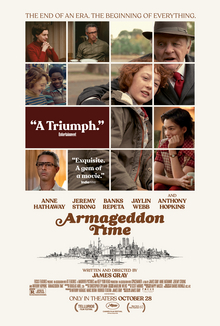A film about a Jewish-American boy who is rebelliously ungrateful of his own affluent background isn’t something is compelling to me even if it features major talents like Anthony Hopkins and Anne Hathaway. But then I realized that we usually get stories from the opposite side of the divide with the underprivileged kid as the protagonist, so this is indeed a novel trajectory. It seems that this is yet another semi-autobiographical film drawn from its director’s life so it does have the ring of truth but it’s probably still a little underwhelming for me.
Beginning at sixth grade in public school, Paul Graff antagonizes the teacher as he has difficulty concentrating in class, preferring to draw pictures instead. But he befriends Johnny, an African-American boy who has been held over from the previous year. At home, he is close to his grandfather Aaron who encourages him to stand up for what he believes in and tell stories of how the family escaped from antisemitic persecution in Ukraine. One day after he and Johnny are caught smoking a joint in the restrooms, his father beats him as punishment with his mother’s approval. His parents decide to send him to the private school his brother attends despite the cost. There all of the students come from rich families and he is forced to wear a uniform. Some of them express racist views which leave him unsure as to how to react. He continues to struggle at school and the teachers tell his parents that he is slow. When Johnny stops by to visit him, he realizes that the black boy has run away from home to escape being forcibly put into the foster system.
Neither the setting nor the characters are particularly interesting to me, so it took some time for me to warm to the story director James Gray wants to tell. Paul is a gentle, head in the clouds type who fantasizes about becoming a famous artist. Yet he is still bratty enough to use the telephone to order takeout when he doesn’t like his mother’s cooking, a form of disobedience so blatant it shocked even me. Johnny wants tp join NASA and become an astronaut but it’s an impossible dream as he seemingly has no interest in academics. They’re not terrible kids but they’re not really sympathetic either. What is interesting is that this friendship with Johnny and the lessons it teaches him about the realities of the world is what is needed for him to shape up and get serious about his life. It’s a grim yet honest assessment that the vast gulf between the two makes all the difference in their outcomes. This is reflected in the decision of Paul’s family to admit him into the school. It is backed by Fred Trump and full of Republicans whose political values are diametrically opposite of their own. When they speak of nurturing the elite of society, Paul probably wants to vomit in his mouth. Yet he can’t deny that it’s true either as that is the central tension of this film.
Banks Repeta who appears to be a new actor truly shines as Paul Graff. With his nervous tics, tendency to zone out and hesitation in speaking up, he is both vulnerable and yet so unconsciously privileged that the audience has a tough time sympathizing with him. I also found the portrayal of his father Irving to be fascinating. In most films, the beating that he gives Paul should instantly condemn him as being an awful father. This film is more subtle than that however, making him out to be a man who is doing the best he can to raise his sons. In the end, he is just like Paul, detesting the unfairness of American society while playing his part in it to survive and even prosper. By contrast, I don’t find the character of Johnny very convincing. It’s great that he has dreams but it isn’t like he has a workable plan to achieve them. By all rights, he should have been more jaded and cynical even at that age.
That the lesson Paul learns about life is an unsatisfying compromise contributes to this film feeling somewhat underwhelming. Yet it’s probably a fair representation of what the director feels himself. It’s impossible not to wonder whatever happened to the real life version of Johnny that Gray once knew. Fair or not, this is the story from Paul’s point of view, and it is interesting to see things from this side for once. Still there’s a reason why most stories focus on the downtrodden. Honest as this account is, it’s just not that compelling.
